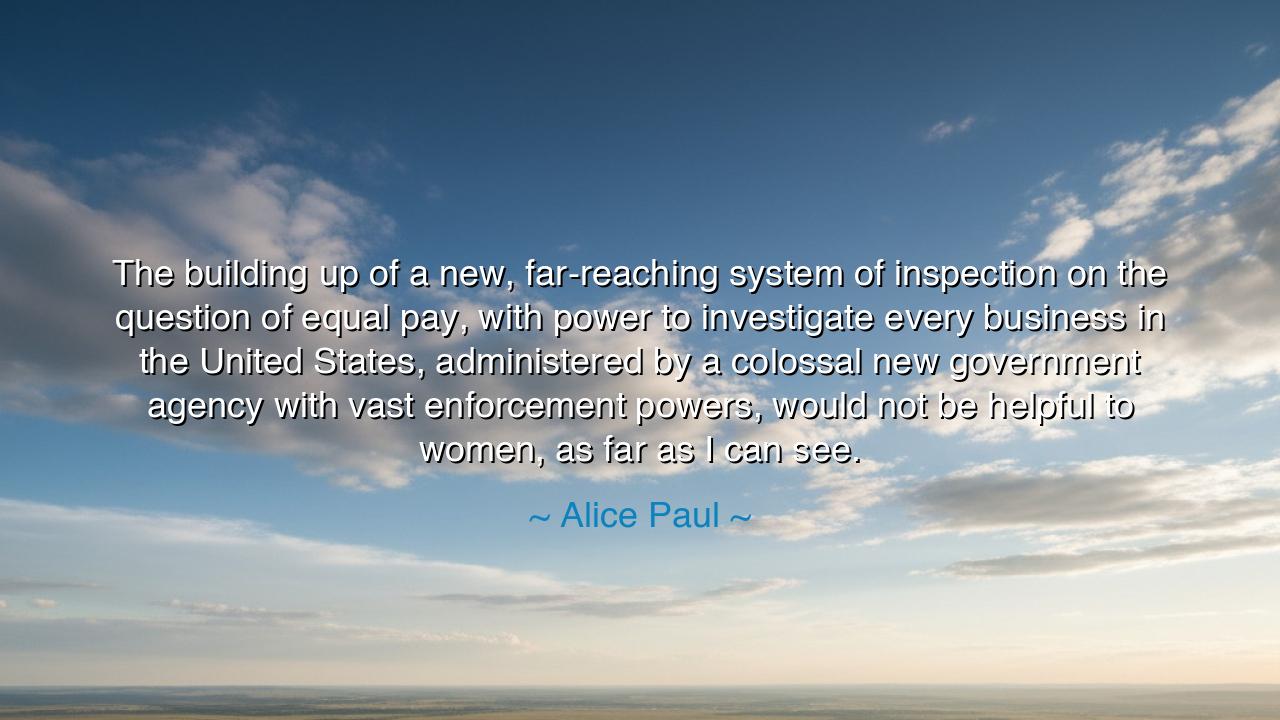
The building up of a new, far-reaching system of inspection on
The building up of a new, far-reaching system of inspection on the question of equal pay, with power to investigate every business in the United States, administered by a colossal new government agency with vast enforcement powers, would not be helpful to women, as far as I can see.






When Alice Paul declared, “The building up of a new, far-reaching system of inspection on the question of equal pay, with power to investigate every business in the United States, administered by a colossal new government agency with vast enforcement powers, would not be helpful to women, as far as I can see,” she spoke not as an opponent of justice, but as a guardian of liberty. Her words echo the eternal tension between freedom and control, between the desire to right wrongs and the danger of replacing one form of oppression with another. Paul, a tireless crusader for women’s rights, understood better than most that equality cannot be achieved by bureaucratic overreach, but by a transformation of conscience and character.
To grasp her meaning, one must remember who Alice Paul was — a woman of steel and vision, the architect of the 19th Amendment that gave women the right to vote. She endured imprisonment, hunger strikes, and public scorn for the sake of freedom. Yet here, in this quote, she warns of a peril that often follows victory: the temptation to use power to enforce virtue. Having fought against the tyranny of exclusion, she recognized the subtle danger of replacing it with the tyranny of regulation. For in the name of justice, men and women alike can create systems that stifle the very independence they seek to protect.
Paul’s words came during the debates of the mid-20th century, when the fight for equal pay was gaining force in America. Some advocates demanded sweeping federal control — vast agencies to inspect, regulate, and punish every workplace. Paul, however, feared that such a “colossal” mechanism might serve not as a liberator, but as a chain. She believed that true equality arises not from compulsion, but from respect for the individual. To her, the path to women’s freedom lay in changing hearts and laws together — not through intrusive bureaucracy, but through constitutional guarantees, such as her lifelong mission: the Equal Rights Amendment.
History offers examples of her wisdom. Consider the fate of Soviet women under the promise of state-enforced equality. The government proclaimed equal pay, equal status, and equal opportunity — and yet, beneath the slogans, women remained bound by poverty, censorship, and the will of the state. Their “equality” existed only on paper, managed by bureaucrats who decided their value. Alice Paul, seeing the seeds of such systems, understood that equality without freedom is but another form of subjugation. A government that claims power to dictate fairness in every corner of life risks becoming master of all.
Her vision, therefore, was deeply moral and spiritual. She did not reject justice — she sought to purify its means. She knew that liberty thrives when individuals are empowered to claim their own worth, not when a vast authority measures and enforces it. To Paul, every woman’s dignity was sacred, not something to be certified by officials, but to be recognized by law and culture alike. She dreamed of a world where character, merit, and courage would determine one’s station — not gender, not privilege, and certainly not the dictates of an all-powerful agency.
In her words lies a timeless warning to all reformers and dreamers: Beware the tools you build to achieve justice, for they may one day be used to deny it. The history of nations shows that systems created to protect the weak often end up controlling them. The hand that begins by enforcing fairness may grow heavy with habit and hunger for power. Alice Paul’s insight, forged in the crucible of struggle, reminds us that the noblest cause must still bow before the higher law of freedom.
The lesson, then, is both philosophical and practical: Seek justice through empowerment, not domination. Reform should awaken conscience, not replace it with command. Let laws be clear and fair, but let the spirit of liberty breathe within them. Each generation must remember that equality and freedom are twin pillars — neither can stand without the other. To serve one while destroying the other is to betray both.
Thus, let us honor Alice Paul’s wisdom not by rejecting progress, but by grounding it in humility. Let every advocate for justice remember that no agency, however vast, can replace the moral will of a free people. True equality is not granted by decree — it is earned by courage, sustained by vigilance, and secured by freedom’s eternal flame.






AAdministratorAdministrator
Welcome, honored guests. Please leave a comment, we will respond soon